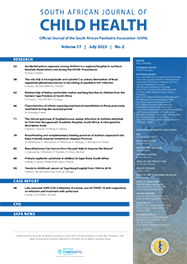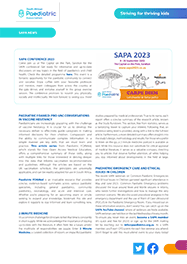Research

A 5-year retrospective analysis of infant death at Salt River Mortuary, Cape Town
Abstract
Background. Infant death is a distressing occurrence and unfortunately remains high in many parts of the world, including South Africa (SA). Despite much research into risk factors for infant death elsewhere, limited SA data are available, particularly pertaining to the city of Cape Town.
Objective. To investigate the burden and profile of infant deaths admitted for medico-legal investigation in Cape Town, SA, with a focus on sudden unexpected death in infants (SUDI).
Methods. A retrospective study of infant deaths admitted to Salt River Mortuary, Cape Town, SA, between 2013 and 2017 is reported.
Results. A total of 1 608 infant deaths were reported over the 5-year study period (total caseload, N=17 730). Of the reported infant deaths, 1 199 (74.56%) cases were admitted as SUDI. Cause of death had been established for the majority of SUDI cases (89%) at autopsy, although 137 cases were undetermined or still under investigation at the time of study and pending ancillary investigations. Many risk factors for SUDI were observed, with co-sleeping documented in 94.65% of the cases. Co-sleeping was significantly associated with a side-sleeping position in infection-related deaths (p<0.001). More than half of the SUDI cases were exposed to tobacco smoke.
Conclusion. These results strongly advocate for the need for awareness campaigns in developing countries to educate caregivers about risk factors for infant death, particularly surrounding the risks of infection. Remarkable decreases in infant death in other countries have been noted following targeted awareness campaigns
Authors' affiliations
L J Heathfield, Division of Forensic Medicine and Toxicology, Faculty of Health Sciences, University of Cape Town, South Africa; MRC/UCT Research Unit for Genomic and Precision Medicine, Division of Human Genetics, Institute of Infectious Diseases and Molecular Medicine, Department of Pathology, University of Cape Town, South Africa
L J Martin, Division of Forensic Medicine and Toxicology, Faculty of Health Sciences, University of Cape Town, South Africa
R Ramesar, 2 MRC/UCT Research Unit for Genomic and Precision Medicine, Division of Human Genetics, Institute of Infectious Diseases and Molecular Medicine, Department of Pathology, University of Cape Town, South Africa
Full Text
Cite this article
Article History
Date published: 2020-10-12
Article Views
Full text views: 1299

.jpg)



Comments on this article
*Read our policy for posting comments here